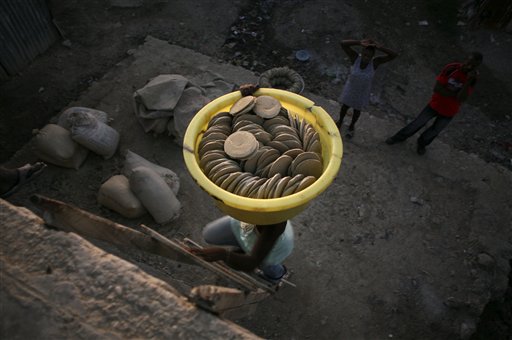| @wehaitians.com | |
No one writes to the tyrants | |
HistoryHeads/Not Just Fade Away |
| Correspond with us, including our executive editor, professor Yves A. Isidor, via electronic mail: |
| letters@wehaitians.com; by way of a telephone: 617-852-7672. |
| Want to send this page or a link to a friend? Click on mail at the top of this window. |
|
 |
|
| Posted Monday, January 28, 2008 |
| Fast worsening economic conditions in Haiti have some rather consuming dirt |
By Jonnathan M. Katz, |
Associated Press Writer |
PORT-AU-PRINCE, Haiti -- (AP) -- It was lunchtime in one of Haiti's worst slums, and Charlene Dumas was eating mud.
 |
| Dried mud cookies. (Arian Cubillos/AP) |
With food prices rising, Haiti's poorest can't afford even a daily plate of rice, and some take desperate measures to fill their bellies.
Charlene, 16 with a one-month-old son, has come to rely on a traditional Haitian remedy for hunger pangs: cookies made of dried yellow dirt from the country's central plateau.
The mud has long been prized by pregnant women and children here as an antacid and source of calcium. But in places like Cite Soleil, the oceanside slum where Charlene shares a two-room house with her baby, five siblings and two unemployed parents, cookies made of dirt, salt and vegetable shortening have become a regular meal.
''When my mother does not cook anything, I have to eat them three times a day,'' Charlene said. Her baby, named Woodson, lay still across her lap, looking slightly thinner than the slim 6 pounds 3 ounces he weighed at birth.
Though she likes their buttery, salty taste, Charlene said the cookies also give her stomach pains. ''When I nurse, the baby sometimes seems colicky too,'' she said.
The Food and Agriculture Organization of the United Nations is increasingly concerned about food prices, which are up as much as 40 percent on some Caribbean islands. Floods and crop damage from the 2007 hurricane season forced the agency to declare states of emergency in Haiti and several other countries.
Caribbean leaders held an emergency summit in December to discuss cutting food taxes and creating large regional farms to reduce dependence on imports.
At the market in the La Salines slum, two cups of rice now sell for $0.60, up 10 cents from December and 50 percent from a year ago. Beans, condensed milk and fruit have gone up at a similar rate, and even the price of the edible clay has risen over the past year by almost $1.50. Dirt to make 100 cookies now costs $5, the cookie makers say.
Still, at about five cents apiece, the cookies are a bargain compared to food staples.
Merchants truck the dirt from the central town of Hinche to the La Salines market, a maze of tables of sweet-smelling vegetables and meat swarming with flies. Women buy the dirt, then process it into mud cookies in places such as Fort Dimanche, a nearby shanty town.
Carrying buckets of dirt and water up ladders to the roof of the former prison for which the slum is named, they strain out rocks and clumps on a sheet, and stir in shortening and salt. Then they pat the mixture into mud cookies and leave them to dry under the scorching sun.
The finished cookies are carried in buckets to markets or sold on the streets.
A reporter sampling a cookie found that it had a smooth consistency and sucked all the moisture out of the mouth as soon as it touched the tongue. For hours, an unpleasant taste of dirt lingered.
Assessments of the health effects are mixed. Dirt can contain deadly parasites or toxins, but can also strengthen the immunity of fetuses in the womb to certain diseases, said Gerald N. Callahan, an immunology professor at Colorado State University who has studied geophagy, the scientific name for dirt-eating.
Haitian doctors say depending on the cookies for sustenance risks malnutrition.
''Trust me, if I see someone eating those cookies, I will discourage it,'' said Dr. Gabriel Thimothee, executive director of Haiti's health ministry.
Marie Noel, 40, sells the cookies in a market to provide for her seven children. Her family also eats them.
''I'm hoping one day I'll have enough food to eat, so I can stop eating these,'' she said. ``I know it's not good for me.''
| Wehaitians.com, the scholarly journal of democracy and human rights |
| More from wehaitians.com |